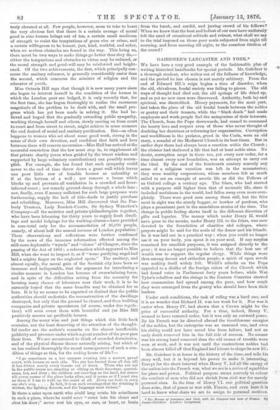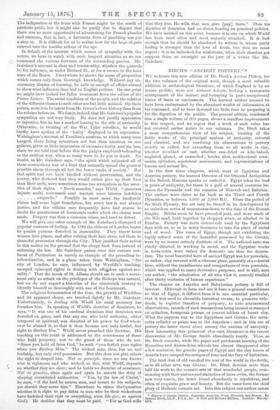GAIRDNER'S LANCASTER AND YORK.*
WE have here a very good example of the fashionable plan of writing historical handbooks for special periods. Mr. Gairdner is a thorough student, who writes out of the fullness of knowledge, and the period he has chosen is not merely arbitrary. From the end of Edward III.'s reign begins a time of disorder, when the old, chivalrous, feudal society was falling to pieces. The old ways of thought had died out, the old springs of life dried up, and as yet no new ones were discovered. Authority, both lay and spiritual, was discredited. Money payments, for the most part, had taken the place of the old feudal bonds between the nobles or gentry and their tenants, while the "black death" had made employers and work-people feel the antagonism of their interests. The Church, from the Pope downwards, had ceased to command the hearty love and respect even of those who never thought of doubting her doctrines or reforming her organisation. Corruption and worldliness in the prelates, greed in the Curia, were an old story, a scandal of the MediEeval Church in its best times. But in earlier days there had always been a reaction within the Church ; the cloister had sheltered a life that had at least noble aims. No doubt, corruption crept in there too, yet every new order, for a time almost every new foundation, was an attempt to carry out the ideal. By the end of the fourteenth century scarcely any sense of a religious vocation was left in the monasteries; they were wealthy corporations, whose members felt as much called to set an example of ascetic life as did the Fellows of an Oxford college a century ago. The friars, who had started with a purpose still higher than that of monastic life, since it included usefulness in the world, had fallen away even more com- pletely. There were good men among them still, but the friar most in sight was the sturdy beggar, or hawker of pardons, who plays a prominent part in the scandalous stories of the time. The change in public feeling shows itself in the different direction of gifts and legacies. The money which under Henry II. would have gone to the monks, under Henry ILL to the friars, was now devoted to the foundation of charities and colleges, where prayers might be said for the souls of the donor and his friends. So it was laid out in a practical way ; when you could no longer use it on your body, you spent it on your soul. If any surplus remained for unselfish purposes, it was assigned directly to the poor ; it was no longer possible to believe that the best use of wealth was to support the regular clergy. While things were thus among decent and orthodox people, a spirit of open revolt was making itself widely felt. Wiclif's attacks on the Pope appealed to a dislike of the foreign rulers of the Church which had found voice in Parliament forty years before, while Wat Tyler's rebellion and the risings in the Eastern Counties showed how communism had spread among the poor, and how much they were estranged from the gentry who should have been their leaders.
Under such conditions, the task of ruling was a bard one, and it is no wonder that Richard II. was too weak for it. Nor was it easier when Henry IV. had shown that a Crown might be the prize of successful audacity. For a time, indeed, Henry V. seemed to have restored order, but it was only an outward peace. By his French war he directed abroad the troublesome energies of the nobles, but the enterprise was an unsound one, and even his ability could not have saved him from failure, had not an early death removed him in the full tide of success. No sooner was his strong hand removed than the old causes of trouble were seen at work, and it was not until the contentious nobles had been almost killed off that England had leisure to shape its new life.
Mr. Gairclner is at home in the history of the time, and tells his story well, but it is beyond his power to make it interesting. Except for the short interval when Henry V. led all the energy of the nation into the French war, what we see is a series of squabbles for place and power. Political purpose seems scarcely to colour the conduct of men who did not shrink from civil war for merely personal aims. In the time of Henry VL one political question does arise, that of peace or war with France, and even here it is hard to know what share we are to assign to personal motives.
* The Howes of Lancaster and York, with Me Conquest and Loss of France. By James Gairdner. London: Longman.
The indignation at the truce with France might be the result of patriotic pride, but it might also be partly due to disgust that there was no more opportunity of adventuring for French plunder and ransoms, that in fact, a favourite form of gambling was put a stop to. It is difficult for us to realise how far the hope of gain entered into the warlike ardour of the age.
In default of the interest which comes of sympathy with the actors, we have to watch with such languid attention as we can command the various fortunes of the contending parties. Mr. Gairdner's account is clear and trustworthy, whether the quarrels be for influence, as under Richard IL, or for a crown, in the later wars of the Roses. Everywhere he shows the sense of proportion which comes only from thorough knowledge. Without any un- necessary display of learning, he tells us enough of affairs abroad to show what influence they had in English politics. On one point we might have looked for fuller treatment from the editor of the Poston Letters. The social condition of the people, and the relation of the different classes to each other are but little noticed. On these points, more is to be learnt from Mr. Green's short history than from the volume before us. We fancy, indeed, that Mr. Gairdner's popular sympathies are not very lively. He does not justify oppression or injustice, but he has a marked leaning to the aide of authority. Otherwise, in treating of the Wat Tyler rebellion, he would hardly have spoken of the ' lenity ' displayed in its repression. 1Valsingham's account of Tresilian's sessions, at which many were hanged, there being sometimes not less than nineteen on one gallows, gives us little impression of excessive lenity, and the less, since we are told that before this the judges employed beheading as the swiftest way, when so many were to be put to death. No doubt, as Mr. Gairdner says, "the spirit which animated all of these commotions was of a kind that naturally spread the greatest possible alarm through all but the lower ranks of society." But that spirit had not been kindled without provocation, and the gentry, who declared that they would rather give up their lives than their serfs, were sometimes none too scrupulous in the asser- tion of their rights. " Novit mundus," says Wiclif, "quantum injuste multi inereenarii aunt tractati nunc labores indebitos exigendo." Possibly in most cases the landlords' claims had some legal foundation, but strict law is not always justice, and the villains may frequently have had reason to doubt the genuineness of documents under which the claims were made. Forgery was then a common crime, and hard to detect.
We will give one other example of Mr. Gairdner's disregard of popular currents of feeling. In 1382 the citizens of London began to punish persons detected in immorality. They threw loose women into prison, and after cutting their hair close, led them in shameful procession through the City. They justified their action in this matter on the ground that the clergy took fines instead of enforcing the law. Mr. Gairdner passes over this curious out- break of Puritanism as merely an example of the prevailing in- subordination, and in a phase taken from Wahiingham, "the city of London, he says, influenced by Wycliffe's teaching, usurped episcopal rights in dealing with offenders against mo- rality." That the monk of St. Albans should gee in such a move- ment only an attack on the privileges of the Bishops was natural, but we do not expect a historian of the nineteenth century to identify himself so thoroughly with one of the fourteenth.
The religious fermentation of the time, the growth of Wiclifism and its apparent decay, are touched lightly by Mr. Gairdner. Unfortunately, in dealing with Wiclif his usual accuracy has forsaken him. In speaking of Wiclif's doctrine of dominion, he says, "It was one of his cardinal doctrines that dominion was founded on grace, and that any one who held authority, either temporal or spiritual, was divested of his power by God when- ever he abused it, so that it then became not only lawful, but right to disobey him." Wiclif never preached this doctrine. His teaching on this point is addressed to the consciences of those who hold property, not to the greed of those who do not. "Since you bold all from God," he said, "you forfeit your rights when you disobey Him." The wicked man, then, has no real lordship, but only civil possession. But this does not give others the right to despoil him. Not on principle, since no one knows who is righteous and who wicked, as this, with Wiclif, depends on whether they are elect; and he holds no doctrine of assurance. Not in practice, since again and again he asserts the duty of obeying constituted authorities. "Yea, by the law of Christ," he says, "if the lord be untrue man, and tyrant to his subjects, yet should they serve him." Elsewhere he raises the cquestion whether it is right to pay debts to men who by their wickedness have forfeited their right to everything, even life (i.e., as against God). He decides that they must be paid. "For as God wills that they live, He wills that men give [pay] them." Thus his doctrine of dominion had no direct bearing on practical politics. We have insisted on this point, because it is one on which Wiclif has been most often and most unjustly attacked. It is bad enough that he should be slandered by writers in whom party feeling is stronger than the love of truth, but this we must expect ; it is an unlooked-for misfortune, when their slanders get support from an oversight on the part of a writer like Mr. Gairdner.



































 Previous page
Previous page